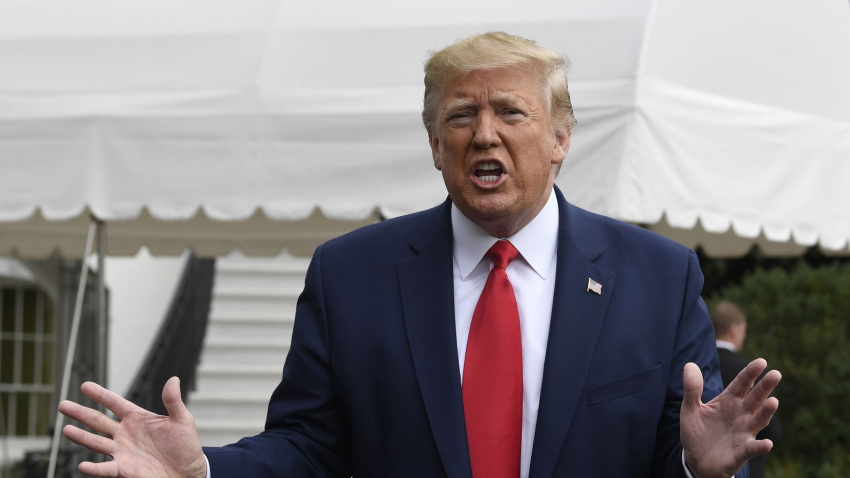Trump may be readier to make concessions to Iran in impeachment situation: Ex UK diplomat

Peter Jenkins, former UK Ambassador to the IAEA and UN says that the initiation of impeachment proceedings against President Trump has created a situation in which he may be readier to make concessions to Iran.
A former associate fellow of the Geneva Centre for Security Policy also adds that “From a European perspective it is hard to have sympathy for the tactic Iran has adopted of punishing Europe for the wrongdoings of the Trump administration.”
Following is the full text of the interview:
Q: Iran has stated in the fourth step of reducing its obligations under JCPOA, such as the level of enrichment and IAEA monitoring. What do you think are the reactions to this?
A: From a European perspective it is hard to have sympathy for the tactic Iran has adopted of punishing Europe for the wrongdoings of the Trump administration. Europe has not been a willing accomplice of that administration’s anti-Iranian “maximum pressure” campaign. It is U.S. gangster tactics that have resulted in European firms deciding that they cannot afford to do business with Iran. President Macron and French diplomats have devoted energy to trying to persuade President Trump to abandon or ease the campaign. European public opinion recognises that the Trump administration’s economic siege of Iran is morally and legally indefensible.
Consequently, European governments will react badly to a fourth step away from full implementation of the JCPOA. They will consider it unjustified. They will urge Iranian Ministers to recall that the JCPOA was designed first and foremost to enable Iran to re-build confidence in the peaceful nature of its nuclear program. Confidence will not be re-built by producing more enriched uranium than Iran needs at this stage of the program or by denying IAEA inspectors access to nuclear-related sites.
I imagine that a further step away from compliance will be equally unwelcome in Moscow and Beijing. Russia and China value the JCPOA as much as Europe does. Both want Iran to demonstrate its commitment to nuclear non-proliferation through compliance. Iranian leaders may feel that they can afford to alienate Europe. They cannot afford to alienate Russia and China.
Q: What can the other side do to prevent Iran from taking other steps and endangering JCPOA?
A: Europe has tried to mitigate the effect of U.S. sanctions by setting up INSTEX. Russia and Iran have just agreed interbank payment arrangements that can boost Iranian trade with the Eurasian Economic Union. China is trying to persuade the Trump administration to issue waivers for Chinese purchases of Iranian oil. France continues to engage both the United States and Iran with a view to enabling trade between Iran and Europe to resume.
In recognition of these initiatives and other factors, it would be reasonable for Iran to declare a six-month or one-year moratorium on steps away from the JCPOA.
Other factors include the following. The initiation of impeachment proceedings against President Trump has created a situation in which he may be readier to make concessions. John Bolton, architect of the maximum pressure campaign, is no longer at Trump’s elbow. Prime Minister Netanyahu of Israel, a fervent supporter of the campaign, now has his mind on staying out of jail by staying in power. Saudi Arabia, another fervent supporter, has at last showed signs of wanting to find a basis for peaceful coexistence with Iran. The next U.S. Presidential elections, which may herald a more enlightened U.S. policy towards Iran, are just over a year away.
Q: Why has Europe not taken appropriate action so far to prevent Iran from reducing its commitments?
A: I think it would be fairer to ask why Europe’s attempted actions have failed. The most promising of these actions has been President Macron’s, to which I have already referred. So, let me focus on that.
President Macron’s idea was to link President Trump’s craving for a meeting with President Rouhani to a lifting of the economic siege of Iran ordered by President Trump. President Macron had in mind a meeting in New York in September when President Rouhani was attending the UN General Assembly. It appears that the meeting failed to take place because President Rouhani did not wish to gratify President Trump’s hunger for a “photo opportunity”. I cannot judge whether this refusal to meet was sensible. I can suggest that it is unjust to continue punishing Europe through non-performance of JCPOA commitments when it is Iran that has thwarted a European attempt to ease the maximum pressure campaign.
Q: How would you assess the future of the JCPOA given the current situation?
A: The agreement’s future depends on Iranian readiness to recognise that the situation has evolved since April, when so-called “strategic patience” ran out, and to adjust policy accordingly. There is now a strong case for allowing time for various initiatives to bear fruit and for American politics to produce changes in U.S. policy. I am confident that Iran’s leaders have the wisdom to understand this. In that case the JCPOA will survive.
Source: Tehran Times

